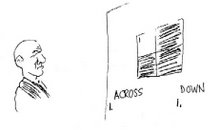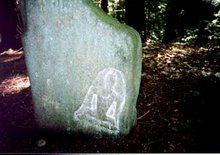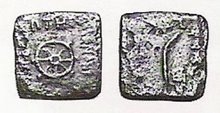Beyond the apparent level, one typically reacts to stimulation of the senses with either craving or aversion. The color, shape, or intensity of light stimulates vision, sounds seem pleasing or disturbing to the ear, tastes please or disturb one through the tongue, smells stimulate through the nose. Something tangible to touch or a thought surfacing in the mind are each processed by our consciousness with an emotional component as well as a logical component.
The Buddha discerned 'actual reality' beneath 'apparent reality.' He surmised that through contact with sensual objects, i.e. salayatana paccaya phasso, a emotional response emerges in the mind, i.e. phassa paccaya vedana. And this emotional reaction to the 'stimulus of sensations' is often one of craving or aversion, i.e. vedana paccaya tanha. This is the actual reality of mind.
When one sees a rope casting a shadow in the twilight, one might fear it as a snake until one confronts that emotion (fear) and investigates the cause of the shadow. When one has approached close enough to discover it is only an old discarded rope, how foolish one feels. Fear, as an example, is often the result of foolishness.
To extend the point: by attending to our 'feelings of sensation' it becomes obvious that one cannot harm another being without first generating a defilement in the mind. One cannot kill a fellow being without animosity. One cannot steal without greed or craving. One cannot commit rape or adultery without lust or passion. Also, one cannot utter wrong speech without some prepared defilement in the mind. Wrong speech is not the use of a foul word or the correction of an error; it is speech behind which is the intent to inflict harm upon another being.
Tuesday, November 4, 2008
Tuesday, May 13, 2008
Sandokai - impressions
Here - the conceptual gift of Sakyamuni,
at once, transported from West to East.
This very day remaining clear and timely,
as a mountain spring from freshly melted snow.
Among people [on this path] are the wise and foolish,
yet neither Northern nor Southern Masters are found.
North or South, wherever you began, by following your desires
you only become attached to the affects of this life.
These attachments form the delusions you will later encounter.
By our senses and our perceptions we form some vision.
Regardless, everything remains in its own unique place.
Although each is bound to everything else, it is independent.
Dependent yet independent.
Visions and emotions create the things which we perceive.
We differentiate sounds from pleasing to disturbing.
In light we perceive good and bad.
In silent darkness differences vanish,
darkness makes everything seem as if one.
The true characteristics of the four elements recede,
as a startled child flees to its mother.
Notice: The heat of the fire, the blowing of the wind,
the fluidity of water, the gravity of the earth.
The reflections we see, the sound we hear, the spices we smell,
the tastes of sweet, salty, bitter, and sour...
All these individual things, like leaflets sprouting at the root,
have beginnings and endings, yet return to their beginning.
Words, like high and low, more and less,
are only useful relative to each other.
As light is to be found in darkness,
so too is darkness found in light.
In darkness is light, but just as with searching in darkness,
this light is not easily found.
Light and darkness have a harmony,
just as your left and your right foot form the harmony of walking.
Almost everything in the universe remains indivisible
and gives us unknown possibilities.
Yet known and unknown sing in harmony.
Notice! The unusual appears in the commonplace,
like a lid that fits a box.
Notice! The unusual appears in the commonplace,
like when the day meets the night in twilight.
By reading this you can participate in the full understanding
which lies hidden in these words.
Notice! Don't rely on your own judgment,
forget who you think you are.
If you can't learn the fundamental truth with your senses,
how will you ever reach the path, regardless of how far you walk?
If you don't see the path immediately beneath your feet,
how will you see it when you are wandering away?
When you walk this path, far and near are dissolved.
If you lose this concept,
mountains and rivers appear as obstacles.
Respectfully I say to one who seeks enlightenment:
walk diligently.
impression: an idea or opinion of what something is like
Translation (1), (2), & (3)
at once, transported from West to East.
This very day remaining clear and timely,
as a mountain spring from freshly melted snow.
Among people [on this path] are the wise and foolish,
yet neither Northern nor Southern Masters are found.
North or South, wherever you began, by following your desires
you only become attached to the affects of this life.
These attachments form the delusions you will later encounter.
By our senses and our perceptions we form some vision.
Regardless, everything remains in its own unique place.
Although each is bound to everything else, it is independent.
Dependent yet independent.
Visions and emotions create the things which we perceive.
We differentiate sounds from pleasing to disturbing.
In light we perceive good and bad.
In silent darkness differences vanish,
darkness makes everything seem as if one.
The true characteristics of the four elements recede,
as a startled child flees to its mother.
Notice: The heat of the fire, the blowing of the wind,
the fluidity of water, the gravity of the earth.
The reflections we see, the sound we hear, the spices we smell,
the tastes of sweet, salty, bitter, and sour...
All these individual things, like leaflets sprouting at the root,
have beginnings and endings, yet return to their beginning.
Words, like high and low, more and less,
are only useful relative to each other.
As light is to be found in darkness,
so too is darkness found in light.
In darkness is light, but just as with searching in darkness,
this light is not easily found.
Light and darkness have a harmony,
just as your left and your right foot form the harmony of walking.
Almost everything in the universe remains indivisible
and gives us unknown possibilities.
Yet known and unknown sing in harmony.
Notice! The unusual appears in the commonplace,
like a lid that fits a box.
Notice! The unusual appears in the commonplace,
like when the day meets the night in twilight.
By reading this you can participate in the full understanding
which lies hidden in these words.
Notice! Don't rely on your own judgment,
forget who you think you are.
If you can't learn the fundamental truth with your senses,
how will you ever reach the path, regardless of how far you walk?
If you don't see the path immediately beneath your feet,
how will you see it when you are wandering away?
When you walk this path, far and near are dissolved.
If you lose this concept,
mountains and rivers appear as obstacles.
Respectfully I say to one who seeks enlightenment:
walk diligently.
impression: an idea or opinion of what something is like
Translation (1), (2), & (3)
Monday, February 11, 2008
Different Strokes - same foundation
Suzuki taught: "Pay close attention to the details of form, for true freedom is found there (Hinayana practice with Mahayana mind)"
HERE
However, in form there is content. That content is emptiness.
Hinayana is a substitute for Theravada:
Four Noble Truths:
1) Suffering
2) Cause of Suffering
3) Extinction of Suffering
4) Eightfold Path
Three Theravada training points:
Sila = moral training (critical thinking)
Samadhi = mind training (corpus of knowledge)
Panna = wisdom training (application of knowledge)
Three characteristics of existence:
aniccam = impermanence
dukkham = suffering
anatta = myth of self
The Three Jewels are:
Buddha = that Gautama Śākyamuni awoke (bodhi)
Dhamma = that Buddha taught
Sangha = that communities of Buddhists exist
The goal is Nirvana (extinguishing desire)
*********************************
This is not rocket science.
*********************************
HERE
However, in form there is content. That content is emptiness.
Hinayana is a substitute for Theravada:
Four Noble Truths:
1) Suffering
2) Cause of Suffering
3) Extinction of Suffering
4) Eightfold Path
Three Theravada training points:
Sila = moral training (critical thinking)
Samadhi = mind training (corpus of knowledge)
Panna = wisdom training (application of knowledge)
Three characteristics of existence:
aniccam = impermanence
dukkham = suffering
anatta = myth of self
The Three Jewels are:
Buddha = that Gautama Śākyamuni awoke (bodhi)
Dhamma = that Buddha taught
Sangha = that communities of Buddhists exist
The goal is Nirvana (extinguishing desire)
*********************************
This is not rocket science.
*********************************
Subscribe to:
Comments (Atom)







